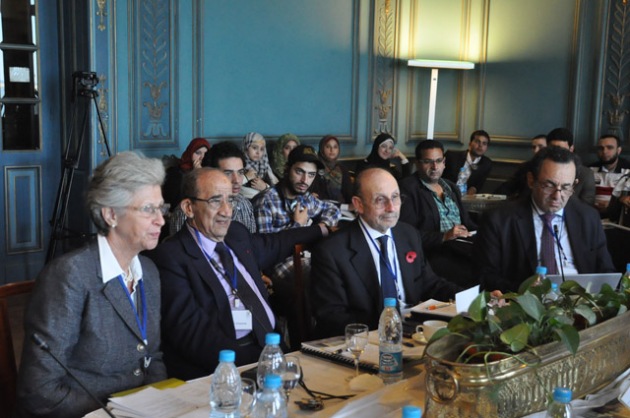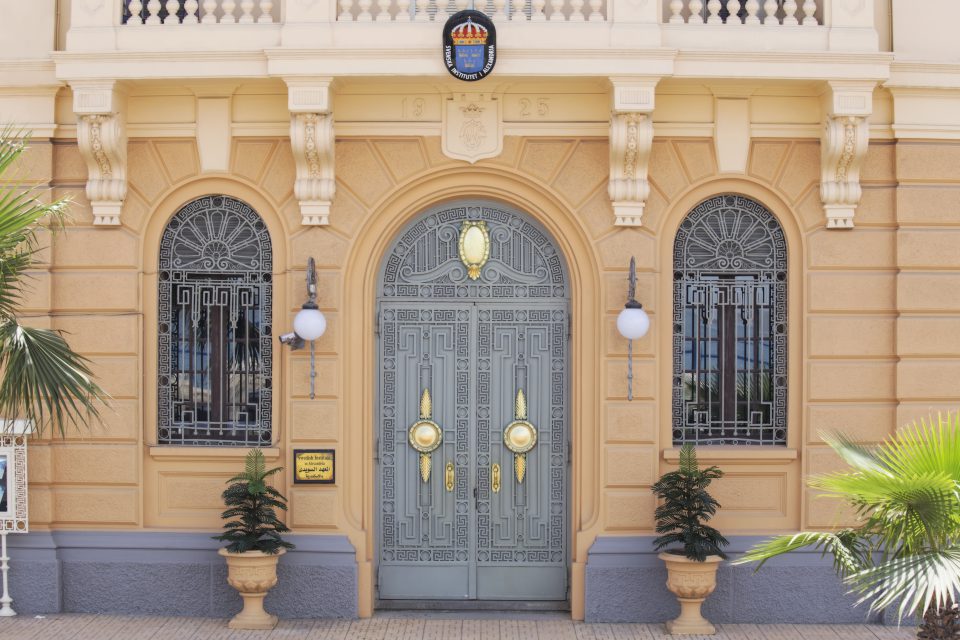 A Tuesday in mid-November, the Swedish Institute Alexandria turned into a scene for a highly controversial debate. The Blue Saloon of the Institute witnessed heated discussions and arguments that dealt with the inflamed issues of religion and secularism in Europe the Middle East-North Africa, MENA.
A Tuesday in mid-November, the Swedish Institute Alexandria turned into a scene for a highly controversial debate. The Blue Saloon of the Institute witnessed heated discussions and arguments that dealt with the inflamed issues of religion and secularism in Europe the Middle East-North Africa, MENA.
The debate was organized by Swedish Institute Alexandria and the International Union for the Dialogue of Cultures, Religions and Peace education “ADIC”. International experts, researchers and Egyptian journalists, gathered in the presence of students from the universities of Cairo, Alexandria and Tanta. Everyone took part in the in depth discussions regarding the conditions of Egyptian society, addressing root causes of the strained relationship between different religious and secular groups within and outside of Egypt.
The Round Table discussion was divided into two main sessions: The first dealt with the relationship between the secular and religious communities, while the second tackled the role of media in promoting cooperation between cultures and religions.
Addressed was the changes that took place in the communities after the Arab Spring revolution, the challenges that the Egyptian state faces during its transition, for example the polarization and non-acceptance of the other. The joint conclusion was that there is a need for building bridges between cultures and religions, especially since the concept of secularism in the Middle East is wrongly and negatively viewed and is considered as contra-religious, or as a western phenomenon.
A number of questions were raised on the differences that exist, and the prevailing discussions of the day tried to identify the gap in perception between the different concepts. The term “secularism” was discussed and whether or not a secular state stands against religion. Secularism is viewed as a negative term since it is often being understood as atheism. The term civil state has been preferred in the MENA region. The discussions touched upon how to draw the line between religion and politics? The Swedish experience was presented, where currently there is a public discussion on how to handle the hostilities towards religions. Sweden has approximately half a million Muslims residing in the country, who have rights that may not exist in any other country.
Respect and coexistence between religions are important. But due to the great controversy regarding secularism and secular states, which has been an ongoing debate throughout history, coexistence sometimes does not seem easy. This is clear in a lot of Muslim countries. Religious diversity must be welcome. This does not mean that people will lose identity, but there must be coexistence a way of coping with others.
“There is a distinction between religion as a belief and religion as a culture. In Europe you can clearly see communities of people living religious culture not adapting to the society they live in, not assimilating.”
“When talking about freedom of expression one has to differentiate between incitement and free speech. Incitement should be prohibited by law, for example if you use media to instigate crimes or for lawlessness. Using media to call for illegal action should be regulated by law.”
The question was raised whether we have a problem with religion; is religion a personal right or a general culture? Put forward was that some political powers are trying to eliminate the idea of democracy, which brought them to power in some Arab countries.
Further there are not only religious fundamentals, there are also secular fundamentals; a sound community is the one that can, as far as possible, stay away from the two extremes. For example the French and Turkish experiences differ from the secular context in most of Europe. It is important to learn from the Erdogan experience on freedom of religion and the veil. Suggested was that there has to be a separation between politics and religion in Egypt because today the politicians belonging to religious stream are considering themselves superior because they are said to derive their point from the reference of Islam. Many issues of worry were raised, for example regarding some voices in Egypt expressing a want to demolish the Sphinx? And whether or not a Coptic individual is an Egyptian citizen? Permit child marriage etc. The general concern was therefore that there are no solutions for the continuous development of the society.
The second session on the role of media on “promoting cooperation between cultures and religions” referred to the importance of improving the image of the neighbor on the other side of the Mediterranean and asked how to limit or stop behavior that could trigger the anger of the other party. During this part heated discussions went on to deal with contemporary issues in Egypt, where university students were invited to participate in the discussions.
During the conference several proposals were made regarding the role of the media promoting relations between different religions and cultures and the role of the media was high-lightened. Some of the key points raised were the need to establish networks of communication between the media in the Arab and European worlds, strengthen the understanding between different religions and cultures, to promote a culture of acceptance and tolerance.
There was also a call for the need to develop mechanisms for dialogue and for promoting the values of justice, tolerance and peaceful coexistence between nations and peoples. Expressed was the need to create a common ground for dialogue in each country through the media, seminars, and conferences. Generally people choose the media that suit their needs, that gives the “messages” that you can agree with.
An Egyptian participant said: “One of the greatest challenges in the Arab world is the need for developing professional media. Professionalism should be a mandatory prerequisite to be able to start a TV channel. Rules for media-professionalism need to be formed.”
Another even greater challenge for the region according to one of the participants; is the religious speech in our countries. “Who are these people giving religious speeches in the mosques on Fridays? Where did they obtain their knowledge, professionalism and duty to take on this role and have this kind of power over the societies?”
Further participants raised the importance of education as a key area to develop to achieve tolerance, coexistence and dialogue. Adding to that; participants stressed the importance of respecting international and universal agreements on human rights.
One of the participants ended the session by stating that “Tolerance does not mean that you are convinced of the other’s opinion, it does not impose any opinion on another’s opinion, it does not seek to coerce people to adopt the same point of view, rather tolerance is a means of co-existence under diversity”

Tack för referat från i november. Tillåt mig visa en debattartikel som nu finns på nätet SvD.se där jag och tunisien-svensken Noureddine Chatti kräver att Swedalex skall komma till användning för stöd till långsiktig dialogpolitik och mer användning av Swedalex i denna process. Artikeln biläggs. Med vänlig hälsning, särskilt till personal som minns min fru och min sejour i Swedalex 2005. Lars Lönnback